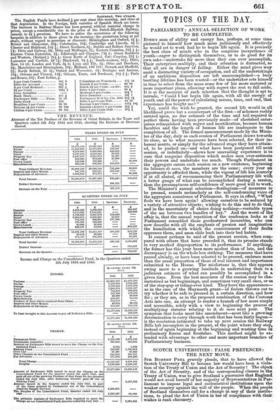TOPICS OF THE DIY.
PARLIAMENT: ANNUAL SELECTION OF WORK TO BE COMPLETED.
EVERY man of ability and energy has, perhaps, at some time pictured to himself how much more judiciously and effectively he would set to work had he to begin life again. It is precisely the best class of minds who in the sanguine inexperience of youth-eager to distinguish themselves, or to do good for its own sake-undertake far more than they can ever accomplish. Their enterprises multiply, and their attention is distracted, so that all are in danger of failing. Either the mind gives way amid a distracting variety of occupation, and all the undertakings of an ambitious disposition are left unaccomplished-a busy bustling lifetime has been wasted-or the undertaker sets himself in time to select from the mass some few of his more matured or more important plans, allowing with regret the rest to fall aside. It is at the moment of such selection that the thought is apt to intrude, "Could I but begin life again, with all the energy of youth and all the power of calculating means, time, and end, that experience has taught me ! " Yet, could the wish be granted, the second life would in all likelihood prove but a counterpart of the first-of schemes rashly entered upon, no due estimate of the time and toil required to perfect them having been previously made-of cherished enter- prises relinquished with regret and mortification because human faculties and the length of human life are inadequate to the completion of all. The formal announcement made by the Minis- ter of the day, duly as each session of Parliament draws towards its close, as to what measures have been selected, for their in- herent merits, or simply for the advanced stage they have attain- ed, to be pushed on-and what have been postponed till next session, or indefinitely-shows how unavailing experience is to cure that sanguine disposition which makes men over-estimate their powers and undertake too much. Though Parliament in the aggregate enters each session on a new existence, beginning its labours de novo the members are the same; every year an opportunity is afforded them, while the vigour of life has scarcely if at all abated, of recommencing their Parliamentary life with a better gauge of what can be accomplished during a session, than the presumptuous self-confidence of mere good will to work.
The Minister's annual selection-florilegium-of measures to be pressed, sounds melancholy as the self-condemning voice of the aggregate conscience of Parliament. It says in effect, "What fools we have been again! allowing ourselves to be seduced by a variety of attractive objects ; wishing to do this and to do that, and in the uncertainty of choice doing nothing-veritable types of the ass between two bundles of hay." And the worst of the affair is, that the annual repetition of the confession looks as if Parliament resembled those goodnattu.ed incurables, who can now describe with all the emphasis of passion and imagination the humiliation with which the consciousness of their faults oppresses them, and anon slide back into their bad habits.
It cannot perhaps be said of the present session, when com- pared with others that have preceded it, that its promise stands in very marked disproportion to its performance. If anything, the former has this year been more modest than of late, and the discrepancy is on the whole less striking. The measures that have passed already, or have been selected to be pressed, embrace more than the usual proportion of those of real interest and importance submitted to the House. The misfortune is, that this appears owing more to a growing lassitude in undertaking than to a judicious estimate of what can possibly be accomplished in a given time. Even the best measures of the session may be cha- racterized as but beginnings, and sometimes very small ones, or as of the stop-gap or tiding-over kind. They have the appearance- as in the case of the Maynooth grant-of feelers thrown out to try whether it be safe to proceed in a certain direction, and how far ; or they are, as in the proposed combination of the Customs Acts into one, an attempt to render a branch of law more simple and accessible, solely with a view to beginning the process of multiplying statutes relating to it de nose next year. The symptom that looks most like amendment-most like a growing determination to carry through work that has been fairly is the resolution intimated to take up next session the Railway Bills left incomplete in the present, at the point where they stop, instead of again beginning at the beginning and wasting time in preliminary fences and flourishes. This method might be ex- tended with advantage to other and more important branches of Parliamentary business.


























 Previous page
Previous page